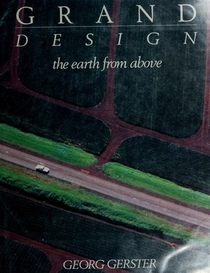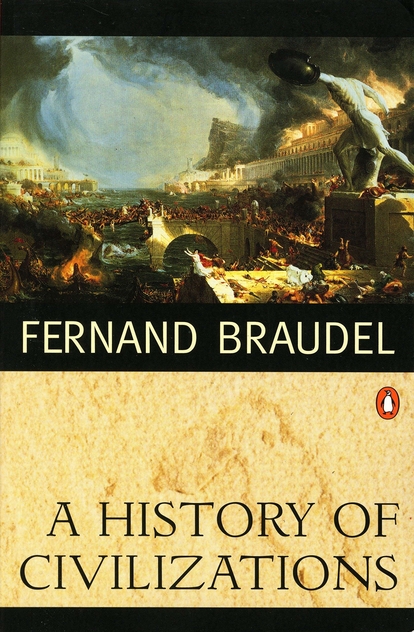
Stewart Brand Books - 75 Must-Reads to Save Civillization
Stewart Brand
Steward Brand has created a list of the books that will help future generations build and rebuild civilizations if something happens. Lists like that are extremely valuable because they conglomerate information of enormous significance.
We appreciated Stewart Brand's reading list, so you can save it somewhere and enjoy it later.
It is an ultimate Stewart Brand books list that consists of 75 essential reading recommendations.
This book list will be interesting to people who love history, art, the structure of governments, geology, psychology, and critical thinking and are simply curious to find out how the world around works.
Check out Stewart Brand favorite books - 75 books worth leaving as a legacy to our kids.
See all
0
likes
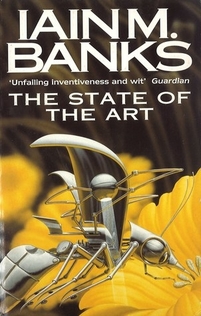
The State Of The Art
The first ever collection of Iain M. Banks's short fiction, this volume includes the acclaimed novella, The State of the Art. This is a striking addition to the growing body of Culture lore, and adds definition and scale to the previous works by using the Earth of 1977 as contrast. The other stories in the collection range from science fiction to horror, dark-coated fantasy to morality tale. All bear the indefinable stamp of Iain Banks's staggering talent.Praise for the Culture series:'Epic in scope, ambitious in its ideas and absorbing in its execution' Independent on Sunday'Banks has created one of the most enduring and endearing visions of the future' Guardian'Jam-packed with extraordinary invention' Scotsman'Compulsive reading' Sunday Telegraph The Culture series:Consider PhlebasThe Player of GamesUse of WeaponsThe State of the ArtExcessionInversionsLook to WindwardMatterSurface DetailThe Hydrogen SonataOther books by Iain M. Banks:Against a Dark BackgroundFeersum EndjinnThe Algebraist
See all
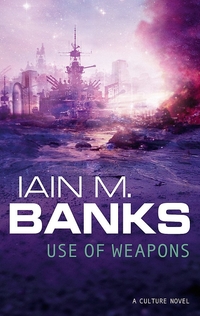
Use Of Weapons
The third Culture novel from the awesome imagination of Iain M. Banks, a modern master of science fiction. The man known as Cheradenine Zakalwe was one of Special Circumstances' foremost agents, changing the destiny of planets to suit the Culture through intrigue, dirty tricks or military action.The woman known as Diziet Sma had plucked him from obscurity and pushed him towards his present eminence, but despite all their dealings she did not know him as well as she thought. The drone known as Skaffen-Amtiskaw knew both of these people. It had once saved the woman's life by massacring her attackers in a particularly bloody manner. It believed the man to be a burnt-out case. But not even its machine intelligence could see the horrors in his past.Praise for the Culture series:'Epic in scope, ambitious in its ideas and absorbing in its execution' Independent on Sunday'Banks has created one of the most enduring and endearing visions of the future' Guardian'Jam-packed with extraordinary invention' Scotsman'Compulsive reading' Sunday Telegraph The Culture series:Consider PhlebasThe Player of GamesUse of WeaponsThe State of the ArtExcessionInversionsLook to WindwardMatterSurface DetailThe Hydrogen SonataOther books by Iain M. Banks:Against a Dark BackgroundFeersum EndjinnThe Algebraist
See all
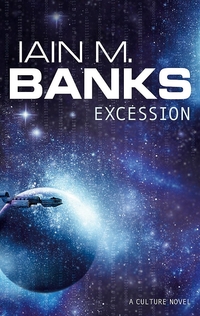
Excession
The fifth Culture book from the awesome imagination of Iain M. Banks, a modern master of science fiction. Two and a half millennia ago, the artifact appeared in a remote corner of space, beside a trillion-year-old dying sun from a different universe. It was a perfect black-body sphere, and it did nothing. Then it disappeared. Now it is back.Praise for the Culture series:'Epic in scope, ambitious in its ideas and absorbing in its execution' Independent on Sunday'Banks has created one of the most enduring and endearing visions of the future' Guardian'Jam-packed with extraordinary invention' Scotsman'Compulsive reading' Sunday Telegraph The Culture series:Consider PhlebasThe Player of GamesUse of WeaponsThe State of the ArtExcessionInversionsLook to WindwardMatterSurface DetailThe Hydrogen SonataOther books by Iain M. Banks:Against a Dark BackgroundFeersum EndjinnThe Algebraist
See all
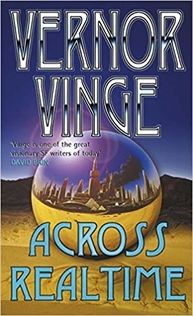
Across Realtime
Two science fiction novels combined into one epic conveying the experience of travelling through millions of years of time.
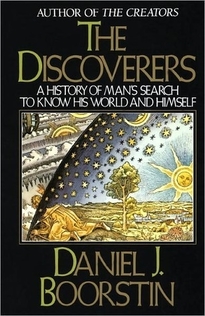
The Discoverers
With more than 700,000 copies in print, this highly praisedtext has reached m ore readers than any other serious work of world history. This deluxe two-volume set gives readers an added visual dimension of interest and excitement. The Discoverers covers a broad panorama ofhuman achievement, as it tells the story of humanity's growing knowledge and points out pivotal moments of exploration and investigation which expanded the boundaries of the known world. Slipcased. 550 illustrations, 200 in full color.
See all
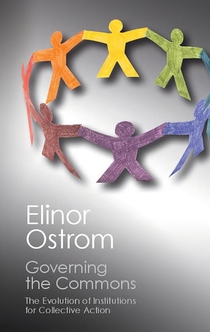
Governing the Commons
The governance of natural resources used by many individuals in common is an issue of increasing concern to policy analysts. Both state control and privatization of resources have been advocated, but neither the state nor the market have been uniformly successful in solving common pool resource problems. After critiquing the foundations of policy analysis as applied to natural resources, Elinor Ostrom here provides a unique body of empirical data to explore conditions under which common pool resource problems have been satisfactorily or unsatisfactorily solved. Dr Ostrom uses institutional analysis to explore different ways - both successful and unsuccessful - of governing the commons. In contrast to the proposition of the 'tragedy of the commons' argument, common pool problems sometimes are solved by voluntary organizations rather than by a coercive state. Among the cases considered are communal tenure in meadows and forests, irrigation communities and other water rights, and fisheries.
See all

The Clash of Civilizations and the Remaking of World Order
The classic study of post-Cold War international relations, more relevant than ever in the post-9/11 world, with a new foreword by Zbigniew Brzezinski.Since its initial publication, The Clash of Civilizations and the Remaking of World Order has become a classic work of international relations and one of the most influential books ever written about foreign affairs. An insightful and powerful analysis of the forces driving global politics, it is as indispensable to our understanding of American foreign policy today as the day it was published. As former National Security Adviser Zbigniew Brzezinski says in his new foreword to the book, it “has earned a place on the shelf of only about a dozen or so truly enduring works that provide the quintessential insights necessary for a broad understanding of world affairs in our time.” Samuel Huntington explains how clashes between civilizations are the greatest threat to world peace but also how an international order based on civilizations is the best safeguard against war. Events since the publication of the book have proved the wisdom of that analysis. The 9/11 attacks and wars in Iraq and Afghanistan have demonstrated the threat of civilizations but have also shown how vital international cross-civilization cooperation is to restoring peace. As ideological distinctions among nations have been replaced by cultural differences, world politics has been reconfigured. Across the globe, new conflicts—and new cooperation—have replaced the old order of the Cold War era. The Clash of Civilizations and the Remaking of World Order explains how the population explosion in Muslim countries and the economic rise of East Asia are changing global politics. These developments challenge Western dominance, promote opposition to supposedly “universal” Western ideals, and intensify intercivilization conflict over such issues as nuclear proliferation, immigration, human rights, and democracy. The Muslim population surge has led to many small wars throughout Eurasia, and the rise of China could lead to a global war of civilizations. Huntington offers a strategy for the West to preserve its unique culture and emphasizes the need for people everywhere to learn to coexist in a complex, multipolar, muliticivilizational world.
See all
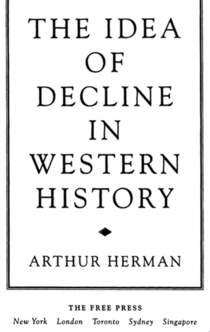
The Idea of Decline in Western History
Historian Arthur Herman traces the roots of declinism and shows how major thinkers, past and present, have contributed to its development as a coherent ideology of cultural pessimism.From Nazism to the Sixties counterculture, from Britain's Fabian socialists to America's multiculturalists, and from Dracula and Freud to Robert Bly and Madonna, this work examines the idea of decline in Western history and sets out to explain how the conviction of civilization's inevitable end has become a fixed part of the modern Western imagination. Through a series of biographical portraits spanning the 19th and 20th centuries, the author traces the roots of declinism and aims to show how major thinkers of the past and present, including Nietzsche, DuBois, Sartre, and Foucault, have contributed to its development as a coherent ideology of cultural pessimism.
See all

Thinking In Time
“A convincing case that careful analysis of the history, issues, individuals, and institutions can lead to better decisions—in business as well as in government” (BusinessWeek).Two noted professors offer easily remembered rules for using history effectively in day-to-day management of governmental and corporate affairs to avoid costly blunders. “An illuminating guide to the use and abuse of history in affairs of state” (Arthur Schlesinger).
See all

Finite and Infinite Games
“There are at least two kinds of games,” states James P. Carse as he begins this extraordinary book. “One could be called finite; the other infinite. A finite game is played for the purpose of winning, an infinite game for the purpose of continuing the play.”Finite games are the familiar contests of everyday life; they are played in order to be won, which is when they end. But infinite games are more mysterious. Their object is not winning, but ensuring the continuation of play. The rules may change, the boundaries may change, even the participants may change—as long as the game is never allowed to come to an end. What are infinite games? How do they affect the ways we play our finite games? What are we doing when we play—finitely or infinitely? And how can infinite games affect the ways in which we live our lives? Carse explores these questions with stunning elegance, teasing out of his distinctions a universe of observation and insight, noting where and why and how we play, finitely and infinitely. He surveys our world—from the finite games of the playing field and playing board to the infinite games found in culture and religion—leaving all we think we know illuminated and transformed. Along the way, Carse finds new ways of understanding everything, from how an actress portrays a role to how we engage in sex, from the nature of evil to the nature of science. Finite games, he shows, may offer wealth and status, power and glory, but infinite games offer something far more subtle and far grander. Carse has written a book rich in insight and aphorism. Already an international literary event, Finite and Infinite Games is certain to be argued about and celebrated for years to come. Reading it is the first step in learning to play the infinite game.
See all

One True God
Western history would be unrecognizable had it not been for people who believed in One True God. There would have been wars, but no religious wars. There would have been moral codes, but no Commandments. Had the Jews been polytheists, they would today be only another barely remembered people, less important, but just as extinct as the Babylonians. Had Christians presented Jesus to the Greco-Roman world as ''another'' God, their faith would long since have gone the way of Mithraism. And surely Islam would never have made it out of the desert had Muhammad not removed Allah from the context of Arab paganism and proclaimed him as the only God. The three great monotheisms changed everything. With his customary clarity and vigor, Rodney Stark explains how and why monotheism has such immense power both to unite and to divide. Why and how did Jews, Christians, and Muslims missionize, and when and why did their efforts falter? Why did both Christianity and Islam suddenly become less tolerant of Jews late in the eleventh century, prompting outbursts of mass murder? Why were the Jewish massacres by Christians concentrated in the cities along the Rhine River, and why did the pogroms by Muslims take place mainly in Granada? How could the Jews persist so long as a minority faith, able to withstand intense pressures to convert? Why did they sometimes assimilate? In the final chapter, Stark also examines the American experience to show that it is possible for committed monotheists to sustain norms of civility toward one another. A sweeping social history of religion, One True God shows how the great monotheisms shaped the past and created the modern world.
See all

The Future of Life
One of the world’s most important scientists, Edward O. Wilson is also an abundantly talented writer who has twice won the Pulitzer Prize. In this, his most personal and timely book to date, he assesses the precarious state of our environment, examining the mass extinctions occurring in our time and the natural treasures we are about to lose forever. Yet, rather than eschewing doomsday prophesies, he spells out a specific plan to save our world while there is still time. His vision is a hopeful one, as economically sound as it is environmentally necessary. Eloquent, practical and wise, this book should be read and studied by anyone concerned with the fate of the natural world.
See all

The Coming Population Crash
A leading environmental writer looks at the unexpected effects—and possible benefits—of a shrinking, graying population Is overpopulation the most important environmental issue of our time? Already widely covered on The Daily Show with Jon Stewart, CNN's Amanpour, and NPR's The Brian Lehrer Show, The Coming Population Crash begs to differ: half the world's women are now having two children or fewer—in developing countries as well as in rich ones. Fred Pearce chronicles the troubling history of efforts to contain the demographic explosion, and then he dives into the environmental, social, and economic effects of our surprising demographic future: a shrinking, graying population; mass migrations; and, just maybe, a wiser world.
See all

Gaia
In this classic work that continues to inspire its many readers, Jim Lovelock puts forward his idea that life on earth functions as a single organism. Written for non-scientists, Gaia is a journey through time and space in search of evidence with which to support a new and radically different model of our planet. In contrast to conventional belief that living matter is passive in the face of threats to its existence, the book explores the hypothesis that the earth's living matter air, ocean, and land surfaces forms a complex system that has the capacity to keep the Earth a fit place for life. Since Gaia was first published, many of Jim Lovelock's predictions have come true and his theory has become a hotly argued topic in scientific circles. In a new Preface to this reissued title, he outlines his present state of the debate.
See all
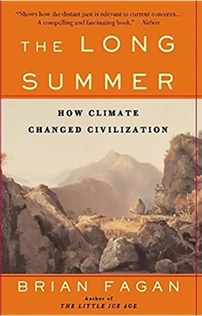
The Long Summer
The Earth's climate has always been in flux: glacial periods and warm ones have slowly and relentlessly alternated for millennia. But the period of global warming of the last 15,000 years is without precedent, and it set the conditions which enabled civilization to arise. It is our 'long summer'. From the almost unimaginably hostile climate of the late Ice to the onset of 'Little Ice Age', which began in 1315 and lasted half a millennium, this book tells the remarkable story of how human history has been influenced by the planet's ever-changing climate. Confronted with such challenges as severe droughts in southwestern Asia and the ripple effects of the Medieval Warm Period, our ancestors have proved themselves to be at their most resilient and adaptable. Deploying all the resources of new climatology from the past century, from tree rings to deep cores from glaciers, Fagan provides us, for the first time, with an historical context in which to understand the unprecedented global warming of today, as we try to anticipate an uncertain climatic future.
See all
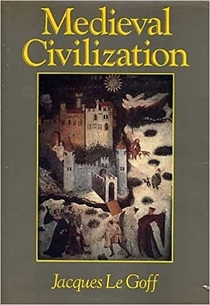
Medieval Civilization 400 - 1500
This one thousand year history of the civilization of western Europe has already been recognized in France as a scholarly contribution of the highest order and as a popular classic. Jacques Le Goff has written a book which will not only be read by generations of students and historians, but which will delight and inform all those interested in the history of medieval Europe. Part one, Historical Evolution , is a narrative account of the entire period, from the barbarian settlement of Roman Europe in the fifth, sixth and seventh centuries to the war-torn crises of Christian Europe in the fourteenth and fifteenth centuries. Part two, Medieval Civilization , is analytical, concerned with the origins of early medieval ideas of culture and religion, the constraints of time and space in a pre-industrial world and the reconstruction of the lives and sensibilities of the people during this long period. Medieval Civilization combines the narrative and descriptive power characteristic of Anglo-Saxon scholarship with the sensitivity and insight of the French historical tradition.
See all

Civilization of the Middle Ages
''No better explanation of medievalism is available to the general reader.'' --BooklistA revised and expanded edition of Norman Cantor's splendidly detailed and lively history of the Middle Ages, containing more than 30 percent new material from the original edition.
See all
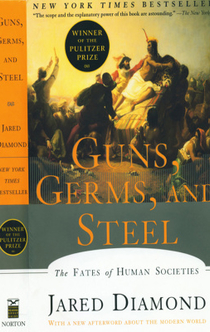
Guns, Germs, and Steel: The Fates of Human Societies
"Fascinating.... Lays a foundation for understanding human history."—Bill Gates In this "artful, informative, and delightful" (William H. McNeill, New York Review of Books) book, Jared Diamond convincingly argues that geographical and environmental factors shaped the modern world. Societies that had had a head start in food production advanced beyond the hunter-gatherer stage, and then developed religion --as well as nasty germs and potent weapons of war --and adventured on sea and land to conquer and decimate preliterate cultures. A major advance in our understanding of human societies, Guns, Germs, and Steel chronicles the way that the modern world came to be and stunningly dismantles racially based theories of human history. Winner of the Pulitzer Prize, the Phi Beta Kappa Award in Science, the Rhone-Poulenc Prize, and the Commonwealth club of California's Gold Medal.
See all
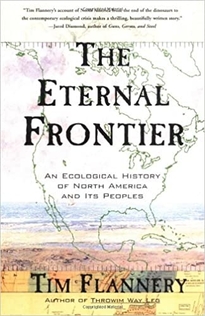
The Eternal Frontier
A comprehensive history of the continent, “full of engaging and attention-catching information about North America’s geology, climate, and paleontology” (The Washington Post Book World). Here, “the rock star of modern science” tells the unforgettable story of the geological and biological evolution of the North American continent, from the time of the asteroid strike that wiped out the dinosaurs 65 million years ago to the present day (Jared Diamond, Pulitzer Prize–winning author of Guns, Germs, and Steel). Flannery describes the development of North America’s deciduous forests and other flora, and tracks the migrations of various animals to and from Europe, Asia, and South America, showing how plant and animal species have either adapted or become extinct. The story spans the massive changes wrought by the ice ages and the coming of the Native Americans. It continues right up to the present, covering the deforestation of the Northeast, the decimation of the buffalo, and other consequences of frontier settlement and the industrial development of the United States. This is science writing at its very best—both an engrossing narrative and a scholarly trove of information that “will forever change your perspective on the North American continent” (The New York Review of Books).
See all
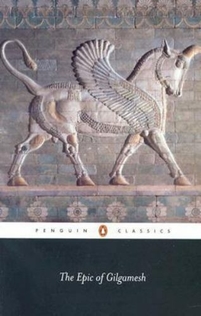
The Epic of Gilgamesh
The ancient Sumerian poem The Epic of Gilgamesh is one of the oldest written stories in existence, translated with an introduction by Andrew George in Penguin Classics.Miraculously preserved on clay tablets dating back as much as four thousand years, the poem of Gilgamesh, king of Uruk, is the world's oldest epic, predating Homer by many centuries. The story tells of Gilgamesh's adventures with the wild man Enkidu, and of his arduous journey to the ends of the earth in quest of the Babylonian Noah and the secret of immortality. Alongside its themes of family, friendship and the duties of kings, The Epic of Gilgamesh is, above all, about mankind's eternal struggle with the fear of death.The Babylonian version has been known for over a century, but linguists are still deciphering new fragments in Akkadian and Sumerian. Andrew George's gripping translation brilliantly combines these into a fluid narrative and will long rank as the definitive English Gilgamesh. If you enjoyed The Epic of Gilgamesh, you might like Homer's Iliad, also available in Penguin Classics.'A masterly new verse translation'The Times'Andrew George has skilfully bridged the gap between a scholarly re-edition and a popular work'London Review of Books
See all
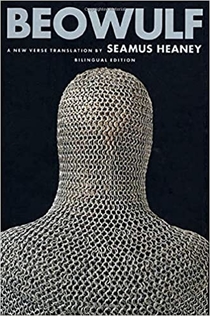
Beowulf
'Beowulf,' composed between the seventh and tenth centuries, is the elegiac narrative of the adventures of Beowulf, a Scandinavian hero who saves the Danes from the seemingly invincible monster Grendel, and, later, from Grendel's mother. He returns to his own country and dies in old age in a vivid battle against a dragon. The poem is about encountering the monstrous, defeating it, and living on in the exhausted aftermath.
See all
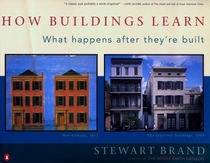
How Buildings Learn
Buildings have often been studies whole in space, but never before have they been studied whole in time. How Buildings Learn is a masterful new synthesis that proposes that buildings adapt best when constantly refined and reshaped by their occupants, and that architects can mature from being artists of space to becoming artists of time.From the connected farmhouses of New England to I.M. Pei's Media Lab, from "satisficing" to "form follows funding," from the evolution of bungalows to the invention of Santa Fe Style, from Low Road military surplus buildings to a High Road English classic like Chatsworth—this is a far-ranging survey of unexplored essential territory.More than any other human artifacts, buildings improve with time—if they're allowed to. How Buildings Learn shows how to work with time rather than against it.
See all

